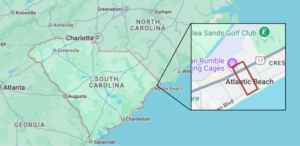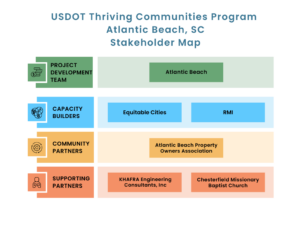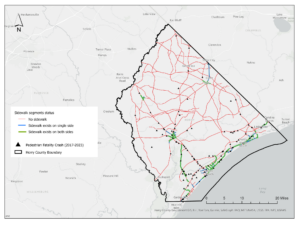USDOT Thriving Communities Program: Atlantic Beach, SC
20 minutes Date Launched/Enacted: Apr 14, 2025 Date Published: April 14, 2025

About the Thriving Communities Program (TCP)
The Thriving Communities Program (TCP) funds tailored technical assistance to under-resourced and disadvantaged communities, helping them better access historic infrastructure investments and deliver transformative projects. The USDOT FY 2022 Thriving Communities Program supports 64 communities across the country with access to a team of capacity builders to develop innovative community engagement methods, identify funding opportunities, and grow long-term capacity to develop and deliver transportation projects that strengthen communities.
TCP Complete Neighborhoods Community of Practice
TCP Communities are grouped into three Communities of Practice: Main Streets, Networked Communities, and Complete Neighborhoods. The 15 communities included under the Complete Neighborhoods Community of Practice are:
| Atlantic Beach, SC | Isabela, PR | Santa Cruz, CA |
| Billings, MT | Lansing, MI | St. Louis County, MO |
| Decatur, IL | Lima, OH | Suffolk, NY |
| East Orange, NJ | Providence, RI | Sumter, SC |
| Indianapolis, IN | Roanoke, VA | Waukegan, IL |
The US Department of Transportation (USDOT) selected a capacity building team led by RMI, including: the American Council for Energy-Efficient Economy (ACEEE), Equitable Cities, Nelson\Nygaard, and the Shared-Use Mobility Center (SUMC), to provide technical assistance to these 15 communities.

Atlantic Beach, South Carolina
The Town of Atlantic Beach is a historical, majority Black beach community located in Horry County, South Carolina. It is the only beachfront community to remain majority black owned and led since its inception. Established in 1934 as a respite for the “colored worker” along the Grand Strand, this community stands as a powerful testament to Black culture, resilience, and self-determination in the face of Jim Crow and systemic racism. Over the decades, Atlantic Beach became a symbol of the strength of the Black community, a place where individuals came together to build not just a space for relaxation and recreation, but also a vibrant cultural and economic hub.
Atlantic Beach quickly became a popular vacation destination for Black families during a time when beaches and resorts in the region were segregated. The community blossomed into a haven where Black entertainers would stay while performing for the surrounding communities. The rich history of creativity and cultural exchange helped shape the identity of the community and cemented its significance in the broader history of Black American culture.
Despite the thriving cultural life of Atlantic Beach, the community faced significant challenges. In the 1960s and 70s, following the Civil Rights Movement and the integration of surrounding communities, Atlantic Beach experienced a marked decline in business and traffic. As integration allowed Black residents to access other beaches, the once-popular vacation destination began to see a slow erosion of visitors, residents, and businesses. Disinvestment in infrastructure and a lack of support from regional and statewide initiatives further deepened the struggles faced by this small, tight-knit community.
Today, ninety years after its founding, Atlantic Beach is recognized as a historic district, having earned approval from the South Carolina Office of Historic Preservation for inclusion in the National Register of Historic Places. This designation honors the town’s rich history and enduring resilience. The year-round population hovers around 250 residents, but that number can soar to more than 10,000 during peak season. Since 2015, the town has seen a surge in residential development, and in 2024, Atlantic Beach celebrated the groundbreaking of its first new business in more than a decade, marking a new chapter in its ongoing revitalization.

Location of Atlantic Beach in the state of South Carolina. Credit: Google Maps.
Key Initiatives for Transportation
The Capacity Builder team, led by Equitable Cities, worked with the Town of Atlantic Beach to identify major goals to be advanced through Thriving Communities Program support:
Share and celebrate the town’s history
Atlantic Beach is a community that has embraced its identity, focusing on preserving its unique, significant history as a Black haven and Gullah Geechee heritage. The community identified the priority of archiving and celebrating this rich legacy as it plans for its future transportation, land use, and economic development.
The Capacity Builder team identified several key ways to provide support for this goal. These included offering technical assistance for securing grant funding dedicated to historic preservation, developing a comprehensive social media strategy, and producing multimedia content such as interviews, photos, and drone footage to authentically capture the essence of the community and its events. Additionally, they could provide funding for local community events, fostering a celebration of the town’s history and culture.

A young family posing for a photograph on the sand in Atlantic Beach. This photo was provided by a community member during the site visit.
Build relationships with SCDOT and the GSATS
Historically, the Town of Atlantic Beach has struggled to build strong relationships with the Grand Strand Area Transportation Study (GSATS), which serves as the local MPO, and the South Carolina Department of Transportation (SCDOT), which has impacted their development. Recognizing the need for improved collaboration, the town seeks to strengthen these relationships and establish meaningful partnerships with these organizations.
To support this effort, the Capacity Builder team proposed drafting correspondence and attending meetings, providing technical expertise and advocating for Atlantic Beach’s priorities. They also suggested inviting officials to participate in community engagement events to foster a productive dialogue between community members, leaders, and these agencies. Additionally, the team committed to providing Atlantic Beach with community-specific data, using GIS analysis and engagement efforts to enhance the town’s position and effectively support its goals during these discussions.
Improve active transportation access
Atlantic Beach has long been excluded from transportation planning initiatives in the region, resulting in their active transportation infrastructure falling behind. In response, the town decided to prioritize improving equity through better access to walking, cycling, and public transit.
The Capacity Builder team identified several ways to support this goal, including implementing a community walk audit and conducting a GIS analysis of local crash data to provide targeted transportation insights. Additionally, the Capacity Builder team offered technical assistance for funding applications focused on active transportation and proposed developing an Active Transportation Toolkit specifically designed to increase Atlantic Beach’s capacity for long-term project implementation.
Key Partners
Atlantic Beach is working with several key partners on these initiatives. Some of these partners include:

Stakeholder Map. Credit: SUMC
Activities through the Thriving Communities Program
Building upon the key initiatives and recommended support efforts identified by Atlantic Beach leaders and the Capacity Builder team, the team focused its efforts on four major activities: community engagement and data collection, GIS mapping, a site visit, and support for pursuing funding opportunities.
Community Engagement and Data Collection
The Thriving Communities Capacity Builder team has played a central role in driving ongoing community engagement efforts within Atlantic Beach. These efforts are focused on identifying the community’s most pressing needs and ensuring that the town’s development aligns with the residents’ priorities. By engaging directly with the community, the team has worked to foster open dialogue and gather valuable insights that will guide future initiatives.
During a Property Owners’ Association meeting in the fall of 2023, the Capacity Builder team facilitated a visioning workshop to collect feedback from community members about their goals and aspirations for the town. This session provided an opportunity for residents to share their ideas and hopes for Atlantic Beach’s future, helping to shape a collective vision. The Capacity Builder team returned to another Property Owners Association meeting in 2024, continuing the cycle of engagement with community members. This continuity in communication has been instrumental in deepening relationships and fostering an environment of trust. With regular interactions, residents have felt more comfortable sharing their thoughts and concerns, allowing for more honest and meaningful exchanges.
The Capacity Builder team also conducted a walk audit, inviting representatives from the South Carolina Department of Transportation (SCDOT), the Grand Strand Area Transportation Study (GSATS), and North Myrtle Beach to participate. This marked the first time these agency and municipal representatives attended an event in Atlantic Beach. The audit not only collected active transportation data but also facilitated relationship development with these key transportation agencies. This hands-on collaboration helped everyone gain a deeper understanding of the opportunities and challenges related to the town’s active transportation infrastructure, and served to strengthen relationships between the community and regional and state officials. Since the walk audit, North Myrtle Beach, SCDOT, and GSATS have been engaging Atlantic Beach on regional projects and working towards collaborating on these efforts. This indicates a positive shift in relationship building with these new collaborators.
To allow for continued feedback for those unable to attend in-person engagements, the Capacity Builder team developed and distributed a community survey that collected information on local priorities, active transportation usage, and other aspects of the key initiatives above. This survey helped ensure that the Capacity Builder team understood the specific needs of Atlantic Beach residents and could tailor future initiatives to reflect these needs. The survey results have also played a crucial role in grant applications by demonstrating community support for the proposed initiatives.
To further engage the community and promote Atlantic Beach to a wider audience, Equitable Cities has developed a social media plan. The team conducted long-form video interviews to capture qualitative data and generate content for social media platforms. These interviews provided valuable insights into the personal experiences of residents, amplifying their voices and enriching the overall engagement process. The Capacity Builder team has also played a crucial role in raising awareness of Atlantic Beach beyond its local borders. The multimedia content gathered during the site visit is being used to produce a promotional video that highlights the beauty and culture of the community. Through these community engagement efforts, the team has gathered both qualitative and quantitative data developing a clearer picture of the Atlantic Beach as a whole.
GIS Mapping
Atlantic Beach’s small size and location created data collection challenges, as it is surrounded on three sides by North Myrtle Beach. The community found that the data used for grant applications tended to represent the broader region, and failed to accurately represent the specific transportation needs within the town’s limits.
To address this, the capacity-building team conducted a detailed analysis of traffic data, focusing on the town’s own safety statistics. This analysis enabled town leaders to highlight the potential positive safety impacts of enhanced mobility infrastructure, such as sidewalks. The resulting maps and analyses helped Atlantic Beach stand out in grant applications, and also provided residents and the local transportation planning agencies with a clearer understanding of which areas should be prioritized for active transportation improvements.

Detailed analysis of traffic data, focusing on the town’s safety statistics. Credit: Equitable Cities
Site Visit
In October 2024, the Capacity Builder Team and local leads conducted a site visit in Atlantic Beach, South Carolina, centered on the community’s 90th anniversary celebration. The visit featured a series of engagements centered on understanding community needs, strengthening local partnerships, and capturing the rich history of Atlantic Beach. Throughout the visit, the TCP team gathered qualitative data, including interviews, photos, and video footage, to capture the voices and stories of community members.
The visit began with a meeting with the Town Manager to discuss priorities, provide background on the Thriving Communities Program, and explore the scope of the technical assistance available. The Equitable Cities team then led a walk audit along Highway 17 and down 30th Ave, culminating at the beachfront. This audit allowed local leaders, policymakers, and community members to identify strengths and pinpoint areas for improvement in their active transportation infrastructure. Later in the day, Atlantic Beach residents led a historical walking tour showcasing significant sites in the community and sharing personal stories and historical accounts of the area.
The following day began with a blessing of the beach by community leaders–a sunrise celebration that prompted participants to reflect on the beauty and resilience of Atlantic Beach. The blessing transitioned into a fun run, emphasizing not only the community’s strong connections but also its accessible active transportation routes. Later, at the Atlantic Beach Property Owners Meeting, the Capacity Builder team provided an overview of the USDOT Thriving Communities Program, reviewed past efforts, shared mapping and traffic safety data, and discussed the property owners’ goals for the community. The highlight of the weekend was a large fish fry, a tribute to the traditional end-of-season celebrations in Atlantic Beach, where more than 300 people gathered to eat and celebrate.

The walk audit along 30th Avenue towards the beach. Credit: Equitable Cities

C & G Bakery and Eatery, Atlantic Beach’s only restaurant, hosted the 90th anniversary fish fry. The Thriving Communities funds helped stimulate and celebrate local economies. Credit: Equitable Cities
Pursuing Funding Opportunities
The Capacity Builder Team is actively identifying and pursuing funding opportunities to support the town’s continued growth and development. Through direct support funds, the town of Atlantic Beach hired grant writing specialists to assist with their FY2025 Better Utilizing Investments to Leverage Development (BUILD) (formerly RAISE) grant application. The Capacity Builder team has collaborated with the town and consulting experts to craft a compelling application, incorporating insights from site visits, interviews, and surveys to showcase strong community support for the project. The application also leverages GIS maps created by the Capacity Builder team to highlight safety concerns in the town.
The Capacity Builder team also supported past applications to FY2024 RAISE grant and has shown continuous support to the Town of Atlantic Beach in applying for federal and nonfederal grants.
Additionally, the Capacity Builder team has helped Atlantic Beach identify and apply for the T-Mobile Hometown Grant, the EPA’s Cultivating Healthy Environments Grant through the Grantmaking Program, the Gullah Geechee Cultural Heritage Corridor Subgrant, and the African American Cultural Heritage Action Fund, which were submitted in the winter of 2024 and February and March of 2025. Initiatives in the applications focused on celebrating and sharing the town’s rich history with a wider audience. These included a series of signs to highlight Atlantic Beach’s new historic designation by showcasing significant sites within the community and the design and implementation of a digital history walk through the town. The Gullah Geechee Cultural Heritage Corridor Subgrant was awarded to the community in December of 2024 and will support Atlantic Beach elevate its Gullah Geechee culture.
The Capacity Builder team also wants to ensure that Atlantic Beach has the tools necessary to continue pursuing funding once the TCP program is complete. Therefore, they will provide the community leaders a list of relevant grants at the close of the TCP program, in order to facilitate their future funding efforts.
2024 Thriving Communities Program Convening for FY 2022 Recipients
The USDOT Build America Bureau’s Office of Technical Assistance hosted the Thriving Communities Program Convening for FY 2022. This two-day event brought together Capacity Builders and community leaders at USDOT’s headquarters in Washington, DC, offering an opportunity to share experiences, exchange ideas, and learn from one another. Denise Gibson Bailey, representing Atlantic Beach, was invited to speak at a session focused on the connections that drive change. During her presentation, she highlighted Atlantic Beach’s achievements in community visioning and fostering creative partnerships with the support of the Thriving Communities Program’s capacity building team.

Still image from the Atlantic Beach presentation at the Thriving Communities Program Convening FY 2022. Credit: USDOT
Conclusion
The USDOT Thriving Communities Program has provided the Town of Atlantic Beach with an opportunity to advance its key goals: celebrating its rich history, fostering strong relationships with local planning agencies, and enhancing active transportation access within the community. The Capacity Builder team collaborated closely with community leaders to pinpoint the most effective strategies for supporting these goals and driving meaningful progress.
Since the onset of TCP grant support in 2023, the Capacity Builder team has provided comprehensive support, establishing strong connections with Atlantic Beach leadership and community members. They have met several town managers, councilpeople, and resident stakeholders, which has made the work more impactful. The relationships developed during the walk audit have paved the way for multiple meetings between Atlantic Beach and SCDOT, an opportunity that had not been available to the community before. The data and additional resources provided by the Capacity Builder team have laid a strong foundation for future work and continued progress towards the community goals. Due to the dedication, effective collaboration, and continued momentum towards project goals, Atlantic Beach was chosen to speak at the October 2024 USDOT Thriving Communities convening in Washington, D.C., to share their success with the wider group of communities across the nation.
Related Resources
Key Partners
- Atlantic Beach Property Owners Association is an organization based in Atlantic Beach that meets to ensure that the interests of the homeowners are considered in town decisions. The association consists of prominent leaders in the community, both who live in Atlantic Beach full time and those who do not.
- KHAFRA Engineering Consultants is an organization that brings engineering expertise to a wide variety of projects, personal or for business. They have been involved in applications for federal grants through TCP and have also supported residents in drafting plans for their development plans on 30th avenue.
- Chesterfield Missionary Baptist Church is a community-driven church that is integral to many of the social programs offered in the city. They have supported various community events and serve the region.
Capacity Building efforts through the Thriving Communities Program are continuing until May 2025. The Capacity Builder team will conduct more technical assistance activities and will update this case study as the program progresses.